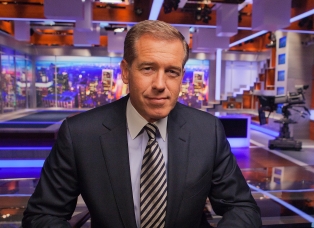Conversation: After a Rough Week, What’s Next for Brian Williams and Network TV News?

As the scandal surrounding NBC anchor Brian Williams continues to unfold, it’s sparking conversations about the state of network news in general, as well as the importance of credibility and trust. On Friday, Los Angeles’ news radio station KNX invited former network news correspondent Judy Muller, crisis PR maven Michael Sitrick and I to discuss the fallout from the Williams mess — and what might come next.
KNX anchor Tom Haule and chief investigative reporter Charles Feldman led the conversation. Here’s an edited transcript of the conversation between us, Haule, Feldman, Muller (now a journalism professor at the University of Southern California) and Sitrick, the chairman and CEO of Sitrick and Company.
Tom Haule: It occurred to me while looking through all the articles and non-attributed quotes on this matter that we’re not dealing with a standard case of guilt or innocence. There’s no standard of “beyond a reasonable doubt” here. Any doubt of any aspect of the situation is really enough to kill a career. If I’m asked, “Do you think Brian Williams is lying?” and I say, “I don’t know,” that’s it. If I don’t know if I can trust the guy, then it’s game over. Judy, your thoughts on that.
Judy Muller: That’s a really good point. If your whole job description as a journalist is being the purveyor and teller of truth, and you are caught in a lie — intentional or not — your credibility is gone. You’ve lost that job description. But this has been death by a thousand Tweets. It’s still going on, all of these things trickling out, which is why I’m sure NBC knew it was coming and he became the news and not the reporter of news. That’s why they suspended him, because it keeps coming.
Charles Feldman: It seems to me that there may be other shoes to drop, and not just Brian Williams. I’m sure NBC would like the whole thing go away by having Brian gone for six months and hoping that if he does come back people won’t remember, or maybe he won’t come back. But there are a lot of people at NBC throughout the years who knew about his propensity to exaggerate. Both the New York Times and Washington Post and others reported that the esteemed Tom Brokaw had spoken with him over the years about trying to stick to the facts. Steve Capus, who was the NBC News president, and now the executive producer of the CBS Evening News, a lot of people knew about this.
Michael Schneider: One of the things that made Brian Williams appealing as the star anchor at NBC was that he was a celebrity. He would go on the Tonight Show with Jimmy Fallon and “slow-jam the news.” He guest hosted Saturday Night Live. This is a man who loves to spin yarns. He’s a storyteller, and some of those tall tales go along with that. NBC put up with it because he was a celebrity, and probably the only anchor that young people actually knew. To some degree NBC put up with it because that’s what made Brian Williams a celebrity.
Judy Muller: I think they did more than put up with it. I think [NBC management] encouraged it. I think this is part of the problem of network news and what it’s become. You look at ABC News, David Muir, it’s all about him. He goes to Cuba and he’s in every shot. This is what they want: Celebrity journalists. And that has corrupted the business.
Michael Sitrick: I don’t think it’s mutually exclusive. I think you can be a celebrity and still have your credibility. Different era and different type of celebrity, but let’s go back to Walter Cronkite. The real issue here is credibility. What’s the difference between a network newscast and a blogger sitting in his or her living room? One would think it’s the vetting of the information that the audience is getting. The question is the credibility of the reports and who was vetting it. What I find interesting, if you look at everything from the helicopter incident to the Hurricane Katrina incidents, where were the people who were saying that it didn’t happen then? That’s the first question I have. OK, he reported it, why wasn’t someone challenging what he was saying then?
Tom Haule: How seriously has NBC bungled its responsibility here to honestly address its audience and explain what’s going on, explain their position and what they expect to have happen?
Michael Sitrick: The question is whether Brian Williams can come back, and until they make that decision, they are in a dilemma as to what to say and how to position this. Their issue is, how do they ensure something like this doesn’t happen again, and how did NBC let this fall through the cracks? It’s not just Brian Williams, it’s NBC. They really were sitting by, trying to figure out what to do and I think while they were trying to figure out what to do they did nothing.
Tom Haule: We keep talking about how Brian Williams was the face of NBC News, and OK, I’ll buy into that. Now they need a face of NBC corporate to say, we got snookered too, or made a mistake, or we did something. Somebody has to show up instead of just constantly slipping these memos under the door.
Michael Sitrick: This business of “It’s very serious, we suspended him for six months without pay,” it’s kind of “half-way pregnant.” What are they going to do? How does suspending him really do anything? And that indicates that he’s coming back. I don’t believe that he can come back. Certainly not with NBC. And NBC has to say, “look, nothing is more important than the trust the viewers have in us, our integrity and our believability. Unfortunately Brian’s lapses have not allowed us to move forward with him and we’re putting place the following measures to make sure this can’t happen again.” Having said that, there are undoubtedly legal restrictions as to what they can do with respect to his contract and probably they can say. They’re also probably looking at whether they can be sued. This is one where they may just want to take the lawsuit.
Charles Feldman [reading a Twitter comment from a listener]: “I can’t get excited about Brian Williams. Are people really so shocked that the mainstream media lied or exaggerated the truth?” Judy, you’re grinning.
Judy Muller: No, I’m grimacing. Because I hear that all the time. Someone says ‘the mainstream media’ and one of the reasons I teach news literacy is to have people become critical thinkers about this. What do you mean? A report you saw on Fox News or MSNBC? This whole way of painting all the media with the same brush is silly. Brian Williams certainly didn’t help that credibility and that image. Yesterday I asked my class, freshmen in college, how many of them thought he should be forgiven. About a third raised their hands, and another third said he should never come back. The last third said, it’s irrelevant. None of them are watching, and they don’t care. They’re much more upset about Jon Stewart leaving The Daily Show. That’s where they get their news.
Tom Haule: I get confronted with the whole media conspiracy thing from time to time, and I have to laugh, because my experience with any newsroom that I’ve been is you put three reporters in a room, you’re going to come out with eight conclusions. No one will agree on anything. I don’t see how you could possibly construct a conspiracy with that kind of a mindset.
Judy Muller: This is a really telling time for the world of journalism. The audience is now part of the conversation. A $10 million anchorman was brought down by what started as a post on Facebook. It was picked up by the mainstream media, the Stars & Stripes, and went forward from there. In less than two weeks it went from Facebook post to the suspension of this anchorman. It’s incredible.
Michael Schneider: I want to add to what Tom mentioned earlier, which is this systemic issue that hits all of journalism, not just broadcast: This issue of “truthiness.” Remember that word, which Stephen Colbert coined a few years ago? We live in an era of truthiness, where everything is not quite accurate, but people will post anyway, or go online with it anyway. All of these Brian Williams lies fall right into it. He was in a helicopter in Iraq, he was in a hotel during Katrina, that’s “close enough” right? That’s the era we’re in now.
Judy Muller: It’s a coincidence, but [CBS News’] Bob Simon died this week. He covered almost every major conflict since Vietnam, and was imprisoned in an Iraqi prison for 40 days and tortured. And yet he went back out and kept reporting on conflicts. That’s a war correspondent. I think his death and his obituary this week, the stark difference between a man who went out and did a couple of airchecks and then talked about it later and exaggerated it, and then someone like Bob Simon, it really struck a chord.
Michael Schneider: Brian Williams was an entertainer, Bob Simon was a reporter.
Charles Feldman: And apparently Brian Williams made a bid to host the Tonight Show.
Michael Schneider: He did, and host Jeopardy as well.
Michael Sitrick: When Judy brought up MSNBC and Fox News, it’s an interesting point. There is a conflation, to use a Brian Williams word, of news and opinion. So what you have is Fox and MSNBC and others now having the reporters not just report the news but morph it into an opinion. That doesn’t mean they make things up — maybe they do — but that doesn’t give them license to make things up or misstate the facts. The viewers — the faithful on the left and the faithful on the right — believe the gospel, and there has been from the straight news reporting, a divergence, both left and right. Embellishment in getting points across. The sophisticated audience member can differentiate. But you don’t expect that from CBS or NBC or the Wall Street Journal or the New York Times or the Los Angeles Times.
Charles Feldman: If NBC puts Brian Williams back in the anchor chair in six months, what happens?
Michael Sitrick: He’s got to come up with a better explanation than he had. He can’t say, “Look, I have to get treatment.” That’s not going to work. People have suggested he do some work with the wounded veterans. That doesn’t address the major issue. The real question is why did he do what he did. I would have him take more than six months off if I were advising him.
Judy Muller: The old time anchors — Jennings, Rather, Cronkite — were foreign correspondents. They worked their way up. That’s no longer true. It’s just straight through, let’s put him out in the field for a couple of nice on-cameras to look like he’s there, and then we’ll bring him back. It is staged.
Michael Schneider: That’s what they did with Brian Williams, when he was anointed Tom Brokaw’s successor, they sent him overseas to get those chops and get that B-roll to show him in the field. But it always felt a little staged.
Judy Muller: All of these anchors now are so powerful. They’ve been given the title of managing editor, which Cronkite didn’t have. Everybody needs an editor, someone to say, “You know Brian, I think you’re not remembering this story well.” But everybody is afraid to do that because he has so much power and nobody wants to lose their job.
Tom Haule: Michael, it’s widely believed that Brian Williams is not coming back to the NBC Nightly News. Lester Holt has that job for the time being. This could represent an opportunity for NBC to set a new standard. Here’s a person of color taking over a job that has, with the exception of Katie Couric, Connie Chung and Max Robinson have been white men.
Michael Schneider: And if Lester Holt got it permanently he would be the first solo anchor of color. It’s really Lester Holt’s to lose at this point. He’s a solid journalist and anchorman and could be the person to come in and right the shop, and bring back some trust to NBC News. I do find it hard to believe that Brian Williams will be coming back to that job. It will be Lester’s, unless the ratings collapse under him.
Charles Feldman: Judy, do you buy that Brian Williams “conflated” the incidents, that he thought he was on that helicopter, or is he just a liar?
Judy Muller: I am a little more forgiving. I think there is such a thing as false memory. I think when people are in traumatic situations and they are fearful that over time — because he reported it correctly initially — you retell and you retell, and you get feedback, people like this story, it somehow becomes true in your mind. I don’t know if that’s what happened here, we may never know what’s in his mind. But I do think it’s possible. I know it’s happened to me. Ronald Reagan believed he liberated the concentration camps and he was never in World War II. I’m not saying Brian Williams’ credibility hasn’t been damaged, and rightfully so, I don’t see how he comes back.
Michael Schneider: We’ve been talking about how Brian Williams was an entertainer, and this is Hollywood, where a very Hollywood trait is everyone exaggerates their resume. Someone who was on the set of ER claims they’re responsible for it being a hit TV show.
Michael Sitrick: We keep saying how Brian Williams wanted to be an entertainer, but he is a newsman. There’s a different standard. The problem we have is not just one conflation, but we have several incidents. If there was one or two, you could explain it away. But when there are multiple situations, that’s where the problem is. I think NBC has to say, “Look, we have a long history of reporting and giving the public news based on facts. Where our integrity has been unblemished. For whatever reason, Brian Williams had his falls. We are vetting the people we put in place. We are putting in place checks and balances, and reviewing our current system to make sure this never happens again.”
Tom Haule: Will he be back?
Michael Schneider: I just don’t think so. If he returns to NBC News, it can’t be in the Nightly News role. Maybe they find another role for him. Maybe they settle out his contract, and he has to rethink his career and regroup from there. It will depend on how Lester Holt does taking over as Nightly News anchor. If those ratings hold up, then Lester Holt has those jobs.
Michael Sitrick: I think it’s going to be very difficult for Brian Williams to return, and it’s really sad, because he’s done a lot of very good reporting and he is very talented. In today’s environment though, nothing goes unnoticed. You make a statement, it’s challenged; how do you respond to it? People have criticized his apology, but what else could he say? I’m also betting the apology probably had lawyers and NBC officials and other people working on it. I think it’s difficult because how does he regain his credibility?
Judy Muller: One of the defining characteristics of credible news organizations is that they are held accountable. They’re not just some blogger in the basement. They are held accountable. To the extent they were late at it, NBC has been accountable with this in suspending him. They are saying, “We value our credibility as a news operation, therefore we are suspending this man.” As long as we can distinguish between legitimate news operations that are independent and accountable, and others that have opinions that need to be challenged, the audience needs to be educated.
Tom Haule: What is the future of network news? Given Facebook, Twitter and social media?
Michael Schneider: It does seem archaic. It was very telling recently when Diane Sawyer retired from ABC News and they named her replacement as lead anchor. It’s George Stephanopoulos, who is still on Good Morning America. So their lead anchor isn’t even on World News Tonight now. That’s the direction all of these news operations are heading. Morning is more important, that’s a much broader and more entertaining show. They’re making a lot of money on the morning shows. The nightly newscasts, the future is more of a question.
Judy Muller: Look at their ads. Depends. Viagra. It’s sad. These are my peeps. I’m not saying it’s bad, it’s just dying.
Tom Haule: The audience is getting old. How do you deal with that?
Michael Sitrick: You have to find a way to be relevant, a way to differentiate yourself. That’s the challenge. The immediacy of the Internet and dealing with that, you have to give them something they can’t get anywhere else.







